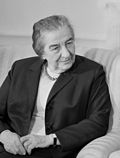First Meir Cabinet | |
|---|---|
| 14th Cabinet of Israel | |
 | |
| Date formed | 17 March 1969 |
| Date dissolved | 15 December 1969 |
| People and organisations | |
| Head of state | Zalman Shazar |
| Head of government | Golda Meir |
| Member parties | Alignment National Religious Party Gahal Independent Liberals Poalei Agudat Yisrael Progress and Development Cooperation and Brotherhood |
| Status in legislature | Coalition |
| Opposition leader | Yitzhak-Meir Levin |
| History | |
| Legislature term | 6th Knesset |
| Predecessor | 13th Cabinet of Israel |
| Successor | 15th Cabinet of Israel |
The fourteenth government of Israel was formed by Golda Meir on 17 March 1969, following the death of Prime Minister Levi Eshkol on 26 February. [1] She kept the same national unity government coalition, including the newly formed Alignment alliance of the Labor Party and Mapam, as well as Gahal, the National Religious Party, the Independent Liberals, Poalei Agudat Yisrael, Progress and Development, Cooperation and Brotherhood. The only change to the cabinet was the scrapping of the Minister of Information post, with the previous post-holder Yisrael Galili becoming a Minister without Portfolio instead.
Contents
The government served until the formation of the fifteenth government by Meir on 15 December 1969, following the October elections.
17 March 1969 | |||||||||||||||||
| |||||||||||||||||
| |||||||||||||||||

